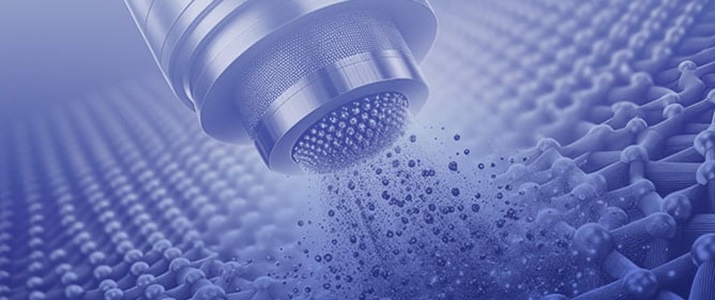铝诱导a-Si结晶的热动力学研究:铝层厚度的影响
IF 4.4
3区 材料科学
Q2 CHEMISTRY, MULTIDISCIPLINARY
引用次数: 0
摘要
采用原位法(同步热分析、透射电子显微镜、电子衍射和四点探针电阻测量)和非原位法(x射线衍射和光学显微镜)研究了铝层对(Al/a- si)n多层膜中非晶硅(a- si)铝诱导结晶动力学和机理的影响。当铝层厚度从10 nm增加到80 nm时,硅结晶的表观活化能Ea由137 kJ/mol降低到117 kJ/mol (Kissinger法),结晶热由12.3 kJ/mol Si增加到16.0 kJ/mol Si。详细的动力学分析表明,单个Al层厚度的变化会导致铝诱导硅结晶机理发生质的变化:Al层厚度≤20 nm。该过程遵循n级自催化反应方程(Cn-X)和Avrami-Erofeev方程(An)描述的两条平行路线:随着Al厚度的增加≥40 nm,该过程连续两个步骤进行。第一个反应可以用n级自催化反应方程(Cn-X)来描述,第二个反应可以用n级反应方程(Fn)来描述。非晶硅结晶机理的改变被认为是由于初始态Al缺陷的程度对结晶过程动力学的影响。本文章由计算机程序翻译,如有差异,请以英文原文为准。
Thermokinetic Study of Aluminum-Induced Crystallization of a-Si: The Effect of Al Layer Thickness
The effect of the aluminum layer on the kinetics and mechanism of aluminum-induced crystallization (AIC) of amorphous silicon (a-Si) in (Al/a-Si)n multilayered films was studied using a complex of in situ methods (simultaneous thermal analysis, transmission electron microscopy, electron diffraction, and four-point probe resistance measurement) and ex situ methods (X-ray diffraction and optical microscopy). An increase in the thickness of the aluminum layer from 10 to 80 nm was found to result in a decrease in the value of the apparent activation energy Ea of silicon crystallization from 137 to 117 kJ/mol (as estimated by the Kissinger method) as well as an increase in the crystallization heat from 12.3 to 16.0 kJ/(mol Si). The detailed kinetic analysis showed that the change in the thickness of an individual Al layer could lead to a qualitative change in the mechanism of aluminum-induced silicon crystallization: with the thickness of Al ≤ 20 nm. The process followed two parallel routes described by the n-th order reaction equation with autocatalysis (Cn-X) and the Avrami–Erofeev equation (An): with an increase in the thickness of Al ≥ 40 nm, the process occurred in two consecutive steps. The first one can be described by the n-th order reaction equation with autocatalysis (Cn-X), and the second one can be described by the n-th order reaction equation (Fn). The change in the mechanism of amorphous silicon crystallization was assumed to be due to the influence of the degree of Al defects at the initial state on the kinetics of the crystallization process.
求助全文
通过发布文献求助,成功后即可免费获取论文全文。
去求助
来源期刊

Nanomaterials
NANOSCIENCE & NANOTECHNOLOGY-MATERIALS SCIENCE, MULTIDISCIPLINARY
CiteScore
8.50
自引率
9.40%
发文量
3841
审稿时长
14.22 days
期刊介绍:
Nanomaterials (ISSN 2076-4991) is an international and interdisciplinary scholarly open access journal. It publishes reviews, regular research papers, communications, and short notes that are relevant to any field of study that involves nanomaterials, with respect to their science and application. Thus, theoretical and experimental articles will be accepted, along with articles that deal with the synthesis and use of nanomaterials. Articles that synthesize information from multiple fields, and which place discoveries within a broader context, will be preferred. There is no restriction on the length of the papers. Our aim is to encourage scientists to publish their experimental and theoretical research in as much detail as possible. Full experimental or methodical details, or both, must be provided for research articles. Computed data or files regarding the full details of the experimental procedure, if unable to be published in a normal way, can be deposited as supplementary material. Nanomaterials is dedicated to a high scientific standard. All manuscripts undergo a rigorous reviewing process and decisions are based on the recommendations of independent reviewers.
 求助内容:
求助内容: 应助结果提醒方式:
应助结果提醒方式:


